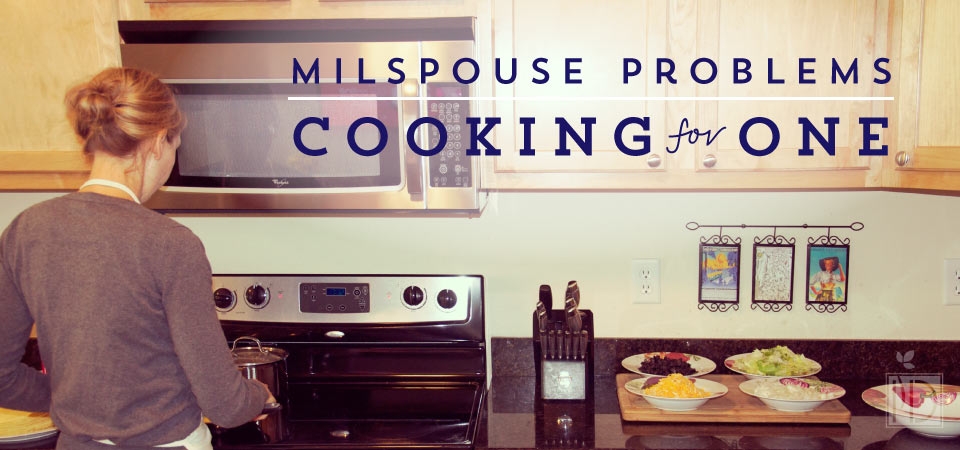Milspouse Problems: Cooking for One
 So there I was, alone on the couch for the second Friday in a row watching the Bachelorette and eating pancakes and ice cream for dinner. Yup, this was a record low during a recent long-term separation from my spouse. A delicious treat indeed, but a meal I would have never made had my husband been home.
So there I was, alone on the couch for the second Friday in a row watching the Bachelorette and eating pancakes and ice cream for dinner. Yup, this was a record low during a recent long-term separation from my spouse. A delicious treat indeed, but a meal I would have never made had my husband been home.
Can you relate? If so, why do we do this to ourselves?
To answer this question, I conducted an informal poll among my milspouse friends. The results revealed a drastic change in eating habits while our spouses are gone. Some opt for convenient comfort foods, while others choose crash diets. All, however, agree that cooking for one is the pits.
While it may be easier to grab a bowl of cereal for dinner, it’s important to understand that when we choose to do this we end up missing out on the nutrients our bodies crave in order to thrive. We can blame the dishes, but really our decisions stem from a much deeper place: our gut.
Scientific studies show that the stomach contains 90 percent as many nerve cells as the brain. Dubbed the “second brain” by researchers, our guts produce an array of hormones and send important health signals throughout the body to help regulate balance. One of the major hormones released is serotonin. “Best known as the ‘feel-good’ molecule, serotonin is known for its role in preventing depression and regulating sleep, appetite and body temperature.” When we ingest fatty foods, the gut sends happy signals to the brain, temporarily making us feel better. Hence the reason we may crave pancakes and ice cream for dinner when we feel lonely. Conversely, the same emotions can upset our stomachs enough to where we don’t feel like eating at all, which is as equally harmful to our health. This could explain why we find ourselves doing things we wouldn’t normally do.
When we start to feel this way it’s important to understand the root cause. During times of separation, loneliness is the usual culprit. A study conducted by Brigham Young University concluded that “low social interaction can be compared to the damage caused by smoking fifteen cigarettes a day, being an alcoholic, or not exercising,” wrote Shasta Nelson, author of Friendships Just Don’t Happen. Military families have access to numerous health campaigns, but none address the paramount importance of a peer-to-peer network.
The first step is to understand and recognize when you’re feeling blue. Second, develop a plan to combat these triggers so you don’t end up regretting your decisions later. Here are three ideas to get you started:
- Cook in bulk with friends – Once a month invite two to three friends over for a cooking party. Each person is responsible for planning at least one healthy meal. Compile a list of ingredients and distribute a joint shopping list prior to arrival. Spend the afternoon socializing while you cook as a group. Divide the meals into individualized containers based on serving size. Each person should leave with multiple meals that can be frozen and eaten throughout the month.
- Form a dinner group – Round up a group of friends for a weekly meal in the comfort of someone’s home. Consider a theme like “Taco Tuesday.” Each week designate a new host who is responsible for the main course. Guests bring a side-dish to complete the meal. Set some healthy guidelines in advance to ensure balance. Skip the brownies and experiment with healthy dessert options instead.
- Start a cookbook club – Same rules apply as book club, but instead select a cookbook. Task group members to cook one recipe from the book weekly. Use social media to spark a conversation and snap photos from home. Select one day each month to get together as a group for a ‘family style’ meal using your favorite recipes. Discuss the cookbook over dinner. Once you finish the book, select a new one and start the process over again. Consider checking out Cook Yourself Sexy in preparation for your spouse’s homecoming.
Humans are naturally social creatures so use these tips to band together with friends during lonely times. Together you can create new positive, habits while offering each other mutual encouragement and support. Cooking for one just got a whole heck of a lot more exciting. Bon appétit!
Do your eating habits change when your spouse is away?

